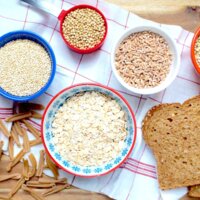Vegetarian Diet for Athletes: Pros, Cons & Nutritionist Advice

A vegetarian diet excludes meat, fish, and poultry. Some variations include dairy and eggs (lacto-ovo), while veganism excludes all animal-based products. More athletes use plant-based nutrition for ethical, health, and performance reasons.
✅ Benefits of a Vegetarian Diet in Sports
1. Faster recovery
Plant foods are rich in antioxidants and phytonutrients that reduce inflammation after workouts.
2. Lower disease risk
Vegetarian diets are linked to reduced risk of heart disease, type 2 diabetes, and high blood pressure.
3. Weight management
High-fiber, low-calorie foods help control hunger and body fat more easily.
4. Better gut health
Fiber supports a healthy gut microbiome, which is crucial for digestion, immunity, and energy metabolism.
⚠️ Challenges of a Vegetarian Diet in Athletics
1. Protein intake may be insufficient
Athletes need more protein. Plants contain it, but in lower concentrations. Strategic combinations or plant-based supplements help fill the gap.
2. Micronutrient deficiencies
Vitamin B12, D, iron, and omega-3s may be lacking and require supplements or fortified foods.
3. High carb intake
Some vegetarians rely too much on carbs for energy, which may hinder lean muscle maintenance.
Nutritionist Tips for Active Vegetarians
- Plan — balance is key to long-term results.
- Combine protein sources: rice + beans, oats + nuts, lentils + quinoa.
- Use quality supplements: vegan protein powder, B12, and omega-3 from algae.
- Get blood tests regularly: B12, iron, vitamin D, ferritin.
- Add nutrient-dense superfoods: spirulina, chia seeds, and hemp protein.
When well-structured, a vegetarian diet can fully support athletic performance. It helps reduce inflammation, supports recovery, and promotes long-term health. Just make sure to monitor protein and micronutrients.
In the world of fitness and healthy living, protein shakes have long become an essential companion — both for those who train actively and for those who simply want to maintain a balanced diet. But how much protein do you really need, when is the best time to consume it, and how can you make shakes not only healthy but also delicious?
In the article "Protein Shakes: When, How Much, and How to Take Them — Tips from a Nutritionist + Recipes", you’ll find practical advice, dosage recommendations, and simple recipes for your daily diet.




Dima
Volodymyr
Tanya